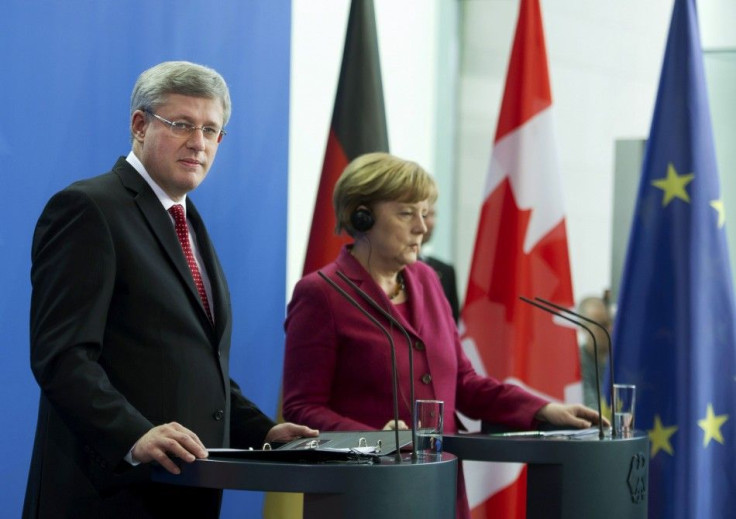Canada Signs Trade Pact With European Union: Ratification Of Treaty By EU Will Hinge On Germany's Stand

Canada and the European Union (EU) signed a Comprehensive Economic and Trade Agreement ( CETA) to strengthen their strategic partnership. The trade deal was signed in Ottawa by Canadian Prime Minister Stephen Harper, Herman Van Rompuy and Jos Manuel Barroso, presidents of the European Council and European Commission, respectively, reported Xinhua.
The deal is expected to increase Canadian exports to EU in products such as seafood, pork and beef. It will also enable Canadians to get access cheap European imports like food, wine and cars. Both sides had concluded the negotiations in August. Now, the deal has to be vetted by the European Council and the EU parliament.
In a joint declaration after the deal, the leaders of Canada and European Union hailed the deal as the beginning of a dynamic chapter in the relations between the two sides. Toronto Sun described the Canada-European Union free trade agreement as historic and unique. Canada is the first G7 country to sign a deal with the EU. Canada legitimately hopes that the new free trade deal will bestow its companies an edge over the U.S. firms as the U.S. has no such free trade deal with EU.
German Dissent
However, the deal faced some hiccups, mainly from Germany, which was opposed to certain provisions in the pact that give multinationals the right to sue national governments. Germany is not happy to see national governments coming under pressure from foreign companies on matters like labour, environment, data protection or food standards. But EU's Samuel Barroso hoped that Germany would gain the most since it is the biggest economy in Europe. Some Canadian municipalities and unions are also opposing the deal. But supporters of the deal are confident that it will breed more jobs and higher trade.
Mr Harper expressed confidence in the free trade agreement and said it would create 80,000 new jobs, while EU claimed the deal will spurt Canada-EU trade by $37 billion a year. The agreement will come into force after being ratified by the European Council and Canadian Parliament.
Trade Diversification
An Economist Blog commented that notwithstanding the back-slapping, what Sigmar Gabriel, Germany's economy minister, was saying about the clause on bilateral investment deals may turn into a flash point.
But the positive side in the deal will be that it helps Mr Harper's focus on trade diversification. So far, Canadian exporters are heavily dependent on the US, which buys 75 percent of Canadian exports, and is the principal source of its imports too. A good deal with EU will boost Mr Harper politically, as he is heading into an election year.





















